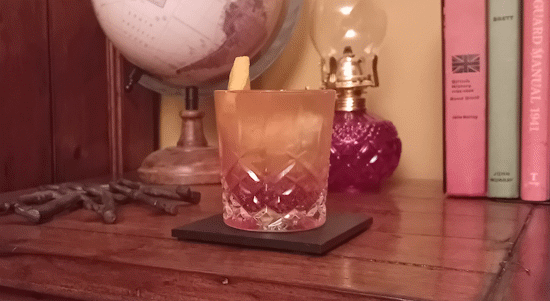
Reminiscent of a Pimm's Cup without the fruit. Made with dandelion and burdock pop, a traditional soft drink from Britain and which dates back to 1265.
Half-fill a shaker with ice.
Add the Plymouth Gin, lemon juice and bitters in the shaker and shake until well-chilled.
Strain into a tumbler over fresh ice.
Top off with dandelion and burdock pop.
Garnish with a lemon wheel.
AI generated anecdote for article length
The late spring sun streamed through the arched windows of Julian’s book-lined study, casting long, dancing shadows across the worn Persian rug. A gentle breeze, carrying the scent of blooming wisteria from the garden below, stirred the pages of a well-loved copy of “Summa Theologica” resting on his desk. Julian’s friends, a group of academics and writers, had gathered for their monthly salon, eager to sample his latest cocktail creation: the “Aquinas.”
Julian, a man with a deep appreciation for both philosophical discourse and the art of mixology, approached cocktail making with the same intellectual curiosity he applied to his studies. He saw each drink as a carefully constructed argument, a balance of flavors and aromas designed to stimulate both the palate and the mind. The Aquinas, he explained, was an attempt to capture the essence of philosophical debate, a blend of crisp gin, tart lemon, and a touch of herbal bitterness, all grounded in the earthy sweetness of dandelion and burdock.
He arranged his ingredients on a mahogany bar cart, their labels gleaming in the warm light: a bottle of Plymouth Gin, its smooth, juniper-forward profile promising a solid foundation; a bowl of freshly squeezed lemon juice, its vibrant yellow hue hinting at its tart tang; a small bottle of Peychaud's Creole Bitters, the final touch of aromatic intrigue; and a selection of chilled bottles of dandelion and burdock pop, its dark, caramel color promising a unique, earthy sweetness. Fresh lemons, ready to contribute their fragrant oils, and tall, elegant tumblers stood ready, awaiting their intellectual concoction.
Julian’s movements were deliberate and precise, almost like a scholar meticulously annotating a text. He began by measuring the gin, its botanical fragrance filling the air, followed by the freshly squeezed lemon juice, its zesty tang adding a layer of brightness. He then added a few dashes of Peychaud's Creole Bitters, their spicy aroma filling the room. He filled the shaker with ice, the cubes clinking a gentle rhythm.
He sealed the shaker and began to shake, his movements rhythmic and purposeful. The ice rattled, a percussive counterpoint to the lively conversation swirling around him. The cold of the shaker began to frost his fingertips, a tangible reminder of the transformation taking place within.
With a practiced hand, he strained the chilled mixture into the tumblers. The liquid, a pale, almost translucent yellow, shimmered invitingly in the golden light. He then topped off each glass with chilled dandelion and burdock pop, the dark, bubbly liquid swirling and fizzing, releasing its unique, earthy aroma. The glasses were transformed, now filled with a layered concoction, a visual and gustatory representation of the cocktail’s complex narrative.
The final touch, the signature garnish, was the lemon wheel. He carefully placed a thin slice of lemon on the rim of each glass, its bright citrus aroma adding a final layer of complexity.
The first glass was presented to his friend, Beatrice, a philosophy professor with a discerning palate and a love for intellectual debate. She held the glass up to the light, admiring its layered appearance. The aroma, a complex blend of gin, lemon, bitters, and earthy sweetness, wafted up to her nose. She took a sip, her eyes closing in appreciation. “Julian,” she murmured, “this is… thought-provoking. It’s like a philosophical argument in a glass.”
The other guests followed suit, each sip met with similar expressions of delighted contemplation. The crisp gin danced on the tongue, its botanical notes balanced by the tart lemon and the earthy sweetness of the dandelion and burdock. The Peychaud's Creole Bitters added a subtle complexity, a hint of spice that lingered on the palate. The bubbly texture of the pop added a refreshing, effervescent quality to the drink. It was a complex and nuanced cocktail, yet perfectly balanced, each element playing its part in a harmonious whole.
As the evening progressed, the Aquinas cocktails flowed, each one a testament to Julian’s skill and intellectual curiosity. The conversation deepened, fueled by the warmth of the drinks and the joy of shared intellectual exploration. The golden light of the setting sun faded into the soft glow of twilight, and the scent of wisteria filled the air. Julian’s study had become a haven, a place where friends gathered, laughter echoed, and the magic of a perfectly crafted cocktail sparked conversations that would linger long after the last drop was savored.
Ingredients
Directions
Half-fill a shaker with ice.
Add the Plymouth Gin, lemon juice and bitters in the shaker and shake until well-chilled.
Strain into a tumbler over fresh ice.
Top off with dandelion and burdock pop.
Garnish with a lemon wheel.
